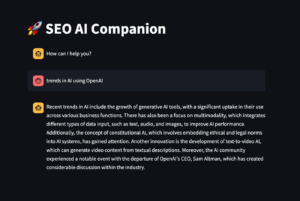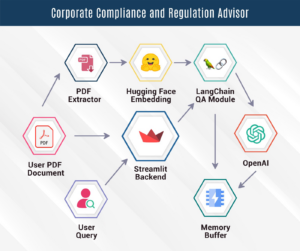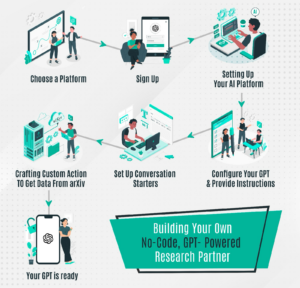The AI startup ecosystem grows fast. What makes this environment survive? Innovators, entrepreneurs and investors now focus on artificial intelligence. To thrive in this landscape, one needs to grasp the dynamics at play. Here, we will look at the key parts that help a sustainable AI startup ecosystem. We will showcase successful practices from industry leaders and new startups.
There are sustainable AI practices. The product accelerators play a role, and ethical leaders are needed to face problems. We wish to share useful insights that can improve your understanding. This could help you in this competitive area. This blog dives into the current investment trends and what future changes may affect the AI world. Whether you are an entrepreneur, investor or just curious about AI, this post will explain the factors behind success in the AI startup ecosystem.
Understanding the AI Startup Ecosystem
The AI startup ecosystem has grown fast in the past few years. There is a global surge in innovation and investment into artificial intelligence technologies. In 2021, AI startups secured over 66 billion dollars in funding. This shows strong interest from investors who understand the transformative applications across sectors.
Key players in the AI startup ecosystem influence the growth of these startups. Big tech firms often act as collaborators or competitors. They provide vital infrastructure and resources while also acquiring talent from startups. Venture capitalists also play an important role. They fund fresh ideas and help nurture exciting startups, forming a network essential for growth.
Academic institutions and research centers help too. They foster talent and drive research that pushes innovation forward. They bridge the gap between theory and real-world applications. Giving something back to the startup ecosystem is vital for progress. An array of tech advancements fuel this ecosystem’s growth.
Innovation in machine learning, natural language processing, and computer vision allows startups to opt unique applications in sectors like healthcare, finance, and retail. For example, the rise of predictive analytics leads startups to help businesses optimize their operations. These technologies open the door for many product and service opportunities.
As we dive deeper into discussions around growth and sustainability in this ecosystem, it becomes clear that more than just creating new technologies is important. The practices that support their development also matter. The next section will dig into sustainable AI practices for startups, focusing on how they can succeed responsibly in the tough landscape today.
Sustainable AI Practices in Startups
The ai startup ecosystem moves rapid. Companies must take sustainable steps. Sustainability boosts a company’s image, drawing in aware consumers and investors. Startups using eco-friendly methods can find better ways to innovate in a tough market.
A major AI startup reduced computer power by 50% thanks to energy-efficient algorithms. This cut lowered energy use, showing sustainability links well with tech growth. Brands that source materials sustainably see higher loyalty from eco-aware audiences. Another AI startup used a circular economy approach, repurposing data centers which reduced waste, and lowering expenses while attracting eco-conscious investors.
Sustainable AI practices come with big benefits. Startups see savings, with some cutting costs by 40% just by using resources wisely. These eco-friendly methods help firms get ready for upcoming environmental laws. This preparation not only helps startups follow the law but makes them more appealing to partners and investors focused on sustainability.
The Role of AI Product Accelerators
AI Product Accelerators play a vital role in the AI startup ecosystem. These programs focus on innovation while helping entrepreneurs develop key skills. They fill an essential void by delivering tailored support, resources, and a shared space where startups can enhance their products and strategies.
Key benefits come from joining an AI Product Accelerator. Startups encounter unique problems when using advanced tech. Accelerator programs provide needed tools and methods to manage those challenges well. Hands-on coaching and workshops speed up product development while startups learn important concepts.
Many AI entrepreneurs have thrived thanks to these accelerators. A number of participants see boosts in metrics like revenue and user growth after mentoring. These programs not only help with operations but also shape the strategic path for startups. They help ensure these businesses stay adaptable and competitive in a changing market.
AI Product Accelerators also provide startups with connections to investors, industry experts, and other entrepreneurs. These connections matter for businesses wanting to grow fast. This connected ecosystem helps foster teamwork and knowledge-sharing, allowing innovative ideas to surface quickly. Sharing different skills and insights supports the AI startup ecosystem’s overall health.
In summary, AI Product Accelerators are key in the AI startup ecosystem. They boost growth of new ideas and help entrepreneurs with structured programs. With these aids, startups are prepared to confront future challenges and take advantage of new possibilities.
When exploring the AI startup ecosystem, recognize the challenges faced by these companies and the chances gained when they overcome them. The following section will dive into the hurdles and prospects present in this fast-changing space.
Challenges and Opportunities in the AI Startup Ecosystem
The ai startup ecosystem thrives with rapid technology changes. It faces many challenges and opportunities that affect growth and long-term success of these ventures. The balance between these aspects is crucial for startups to navigate this landscape.
Funding access is a major hurdle for ai startups. Around 60% mention it as a significant barrier. This challenge restrict their ability to innovate and expand. To gain investment, startups must show both technical capability and clear paths to profitability. Investors want firms with strong value proposition.
Regulatory and ethical issues create extra difficulties. Startups need to align with changing regulations focused on data protection and ethical AI. For example, adhering to GDPR is vital for gaining trust from consumers and stakeholders. Those addressing these challenges can gain a competitive edge by appealing to clients who care about ethics.
Many ai startups also deal with talent shortages and skill gaps. The demand for experts in AI outstrips supply. Reports suggest over 50% of startups find it tough to recruit qualified professionals. This issue can slow down progress and hinder innovation. Partnerships with educational institutions can help close this skills gap.
Despite these issues, significant chances for collaboration exist. Partnerships with academia stand out. Startups work more with universities and research labs to use advanced research. These alliances boost innovation while giving startups important credibility.
By tackling funding, regulations, talent issues, and promoting partnerships, ai startups can create strong business models. This will help them manage the complexity of the startup ecosystem. Additionally, focusing on ethical leadership enables them to build trust and integrity, leading to long-term growth.
Ethical Leadership in AI Startups
The ai startup ecosystem sees a growing importance of ethical leadership. This is key for sustainable growth and innovation within the industry. With ai tech advancing fast, ethical issues need attention. Startups should have ethical frameworks that shape their development, driving profit alongside societal benefits.
Creating a transparent culture is key for ai startups that seek trust among stakeholders. Many consumers want brands to show social responsibility. Startups that follow ethical practices not only boost their reputation but also attract customers and investors. When startups are open about their algorithms, they can lessen biases and the impacts of ai technologies. This transparency helps them shine in a competitive space.
Examples show the benefits of ethical leadership in ai startups. Startups with strong ethical guidelines often find a competitive edge. For example, some have launched projects to ensure their ai models are free from bias. This helps them appeal to a wider audience. Moreover, involving different communities in ai development leads to solutions that meet a variety of needs and values, solidifying ethical leadership in their efforts.
Looking at the ai startup ecosystem reveals that ethical leadership is vital. It serves not only as a moral choice but also as a strategy. Committing to these practices increases innovation and ensures ai’s impact goes beyond just profit, shaping a sustainable future in ai. Next we explore investment trends in the ai startup ecosystem and how ethical leadership affects investor views and funding chances.
Investment Dynamics in the AI Startup Ecosystem
The AI startup ecosystem shows a clear rise in investor interest for AI technologies. As industries adopt AI solutions, venture capitalists and angel investors see the transforming power of these innovations. In 2021, venture capital funding in AI startups hit around $33 billion. This number is much higher compared to past years.
Funding sources for AI startups include many critical avenues. Venture capital leads the way, it provides large financial backing for a piece of equity. Angel investors also play a big role, especially at the seed stages of startups. Government grants encourage innovation too. They offer non-dilutive funding roots. These funding avenues help startups grow and disrupt market norms.
Several factors affect investment decisions within the AI startup ecosystem. Investors look for startups with clear product-market fit and innovative AI use cases. Additionally, expertise in the team, scalability potential and a good business model are key for funding. In this competitive space, startups with success records and partnerships attract more investment and offer better ROI chances.
Looking ahead, future AI investment trends suggest ongoing growth. Analysts predict investments will target sectors like healthcare, finance and autonomous systems. Especially important are startups that adopt ethical AI practices. This trend comes from rising consumer needs for transparency and accountability, linking back to ethical leadership in AI startups.
As we look towards the future, these investment dynamics underline the health of the AI startup ecosystem. They also open doors to emerging trends shaping its future. Understanding financial flow and investor interests better shows how sustainable AI startups can be while transitioning to trends shaping the future of the AI startup ecosystem.
Trends Shaping the Future of the AI Startup Ecosystem
As we explore the dynamics within the ai startup ecosystem, several trends are emerging that shape its future. One major trend is the rise of regulatory frameworks that influence how startups operate. With the fast development of ai tech, governments are increasing oversight. This means startups must ensure compliance while promoting innovation. Transparency and accountability are crucial as these regulations become stricter.
Another important trend involves partnerships between ai startups and traditional industries. Businesses in various sectors see the potential of ai. They form collaborations to use advanced technology for better operational efficiency. For example, ai integration in healthcare and finance highlights the need for startups to adapt their solutions. This teamwork enables knowledge sharing and quickens ai adoption in different fields.
The arrival of new ai technologies alters the startup field. Innovations like quantum computing and generative adversarial networks create opportunities for exploration. These technologies improve current ai applications and foster unique business models. Startups taking advantage of these innovations gain a competitive edge in this fast-changing ecosystem.
Moreover, there is an increase in ethical ai initiatives among startups. With society becoming aware of ai’s impacts on privacy and security, startups focus on ethical practices. This emphasis not only addresses public concerns but opens funding opportunities. Partnerships with organizations valuing corporate social responsibility increase as ethical practices grow.
In conclusion, the ai startup ecosystem’s future will be shaped by regulatory changes, cross-industry collaborations, technological advancements, and a strong focus on ethics. Startups that adapt to these trends will secure a good position in this competitive arena, ensuring steady growth and positive impact.
Conclusion
The AI startup ecosystem is a mix of innovation, sustainability, and growth. In this article, we explored this landscape, focusing on sustainable practices, AI product accelerators, and ethical leadership. We also looked at investments shaping the future and challenges and opportunities in this ecosystem.
As you pursue your AI startup goals, keep these insights in mind. Use sustainable practices. Encourage collaboration. Ethics enhance your venture’s resilience. Trends we discussed suggest a bright future. Now is the time to position yourself in this flourishing ecosystem.
By knowing the AI startup ecosystem well, you can help its success. Face challenges. Capture opportunities. Let your ideas develop in this landscape. Together, we can build an AI future that is innovative and also responsible and sustainable.
About AI Product Accelerator
AI Product Accelerator is a structured 12-week program designed to empower aspiring and experienced AI entrepreneurs to build and launch valuable AI products.
By providing comprehensive coaching, practical insights, and a supportive community, we help transform innovative AI concepts into market-ready solutions that truly matter. Join us today to unlock your potential and bring your AI vision to life!




